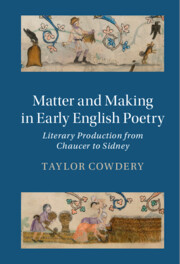Book contents
- Matter and Making in Early English Poetry
- Cambridge Studies in Medieval Literature
- Matter and Making in Early English Poetry
- Copyright page
- Contents
- Acknowledgments
- Abbreviations and Editorial Conventions
- Introduction
- Chapter 1 Words and Deeds in Chaucer
- Chapter 2 Gower and the Crying Voice
- Chapter 3 Hoccleve and the Force of Literature
- Chapter 4 Lydgate and the Surplus of History
- Chapter 5 Copy and Copia in Skelton
- Chapter 6 Wyatt’s Grace
- Epilogue
- Notes
- Bibliography
- Index
- Cambridge Studies in Medieval Literature
Chapter 3 - Hoccleve and the Force of Literature
Published online by Cambridge University Press: 15 June 2023
- Matter and Making in Early English Poetry
- Cambridge Studies in Medieval Literature
- Matter and Making in Early English Poetry
- Copyright page
- Contents
- Acknowledgments
- Abbreviations and Editorial Conventions
- Introduction
- Chapter 1 Words and Deeds in Chaucer
- Chapter 2 Gower and the Crying Voice
- Chapter 3 Hoccleve and the Force of Literature
- Chapter 4 Lydgate and the Surplus of History
- Chapter 5 Copy and Copia in Skelton
- Chapter 6 Wyatt’s Grace
- Epilogue
- Notes
- Bibliography
- Index
- Cambridge Studies in Medieval Literature
Summary
Thomas Hoccleve has long been identified both as an autobiographical poet and as a poet who hoped that his writings would speak on his behalf to prospective readers and patrons. This chapter builds upon these insights by suggesting that Hoccleve felt certain literary materials could exercise a quasi-religious or even quasi-legal force, or “vertu,” in the social world. I argue that Hoccleve’s faith in this idea was motivated by his familiarity with two other late-medieval discourses in which certain words were believed to possess a direct and unmediated kind of power: the language of Lancastrian bureaucracy, which Hoccleve knew firsthand from his work at the Privy Seal, and the language of the church, and in particular sacramental language. I suggest that, in the Series, Hoccleve attempts to write a kind of poetry that will exercise an analogous kind of “vertu” upon his audience. By composing a book that will speak directly to the “prees” on his behalf, he hopes to circumvent the skepticism with which his own words have been received by his readers and patrons in the wake of his “wilde infirmitee”—even if he doubts that, in the end, the Series will do exactly what he wishes.
- Type
- Chapter
- Information
- Matter and Making in Early English PoetryLiterary Production from Chaucer to Sidney, pp. 83 - 110Publisher: Cambridge University PressPrint publication year: 2023



